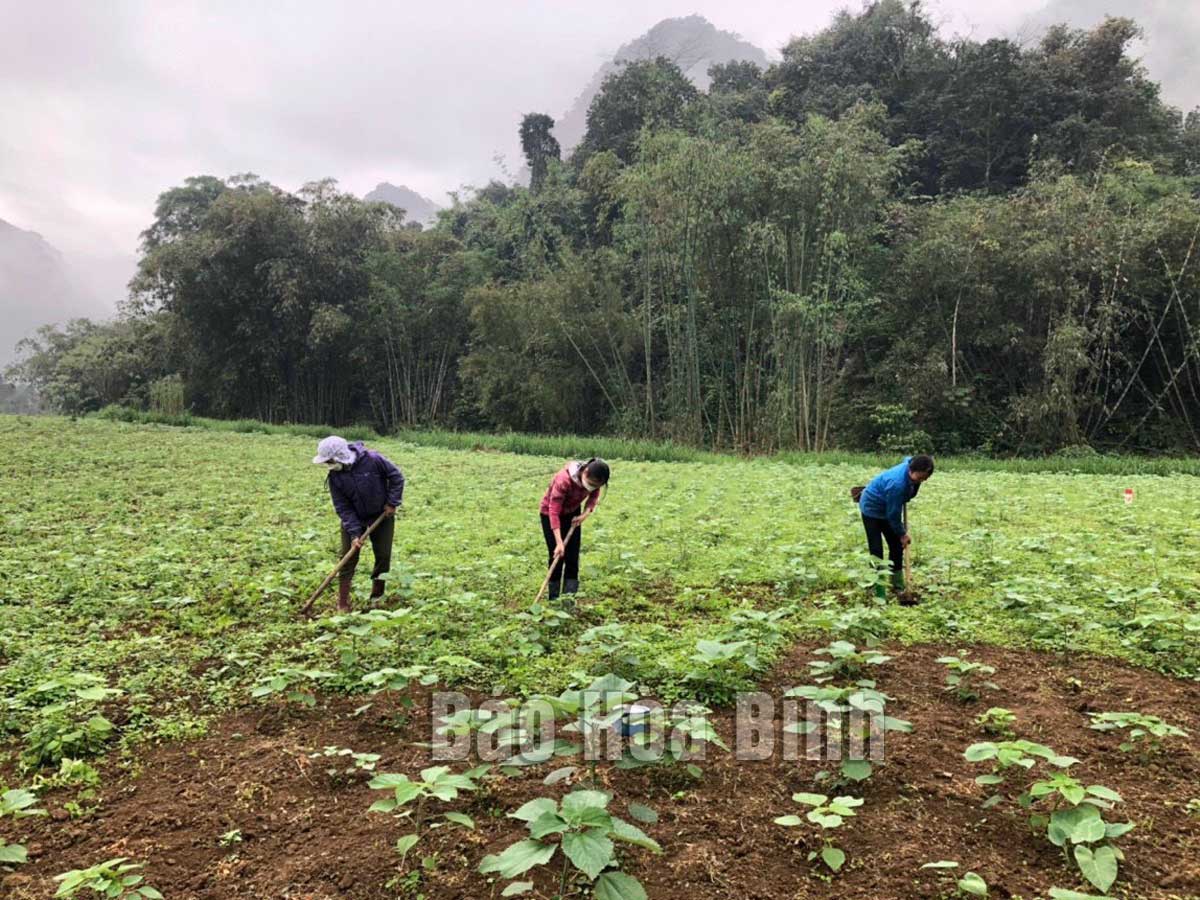
(HBO) – The Hoa Binh Department of Agriculture and Rural Development in collaboration with the An Phuoc Agricultural JSC began a trial planting of ramie (scientific name: Boehmeria Nivea) in some localities in the province in January 2021. After nearly two years, the plant has grown well on the local soil, bringing about incomes for growers.

Farmers in Chieng Chau commune, Mai Chau district, take care of ramie plants.
The main product of ramie, a quite familiar plant in Vietnam, is fiber, which can be used to weave raw fabrics or make ropes and fishing nets. However, it was not until 2021 that the plant was planted in large areas across districts in Hoa Binh.
As of October this year, the total area of ramie in the province neared 260 ha, mainly in upland districts and Hoa Binh city, with 435 households participating in the planting. Da Bac district has the largest plantation of 107 ha, followed by Mai Chau district with 72 ha.
As one of the first to join the trial planting in Bua hamlet, Trung Thanh commune, Da Bac, Luong Van Toan said the plant is relatively easy to cultivate, grows well and quickly for harvest if properly fertilised.
According to the leader of the provincial sub-department of cultivation and plant protection, the average yield of each crop is between 750 and 900 kg of dried bark per ha, creating an income of some 120 - 145 million VND (5,049 – 6,101 USD) per ha on an annual basis. However, this is not the maximum productivity of the plant; higher yields are expected in better cultivation conditions.
An Phuoc plans to expand the current ramie plantation to 300 hectares in 2023.
Many households growing the plant said that the initial investment cost is quite high, at about 40 million VND per ha. For sustainable and long-term growth, it is necessary to have a bark processing facility in the area and a commitment from enterprises involved to ensure long-term planting areas, they said.
Echoing the view, Nguyen Duc Bien, Vice Chairman of the provincial Farmers' Association, said that before scaling up and mass planting, it is necessary to conduct research and carefully evaluate the economic efficiency of the plant./.
The Standing Board of the Hoa Binh provincial Party Committee has agreed in principle on a proposal by the Standing Board of the Party Committee of Hoa Binh city to gather feedback on the city’s 1:2000 zoning plan, which forms part of its broader urban development strategy.
Hoa Binh province has made notable progress in public administration reform and digital government development, with the satisfaction index among citizens and businesses reaching over 84%, according to recent government evaluations.
Thanks to great efforts by local authorities in recent times, the governance and public administration performance of Mai Chau district has been significantly improved.
In the afternoon of June 6, the Party Committee, the People's Council, the People's Committee and the Fatherland Front of Lac Son district solemnly held a meeting to celebrate the 139th anniversary of the district's founding (1886–2025) and the 79th anniversary of the establishment of the district's Party Committee (1946–2025). There was the attendance of Mr. Bui Van Thang, the Vice Chairman of the Provincial People's Council; Mr. Quach Tat Liem, the Vice Chairman of the Provincial People's Committee; Ms. Dang Bich Ngoc, the Deputy Head of the National Assembly Delegation of the province; as well as the former leaders of the province and district through various periods, who are the natives of the district.
Implementing the Politburo’s Resolution No. 57-NQ/TW on breakthroughs in science – technology, innovation, and digital transformation is a golden opportunity for the northern mountainous province of Hoa Binh to renew growth model, improve competitive edge and shorten digital gap.
Resolution 57-NQ/TW, issued by the Politburo on December 22, 2024, identifies sci-tech, innovation, and digital transformation as strategic breakthroughs to build a developed and prosperous nation. In Hoa Binh province, this spirit is not just a slogan, it’s being put into action through concrete initiatives that form a "new development triangle”: digital citizenship, digital economy, and digital administration.



